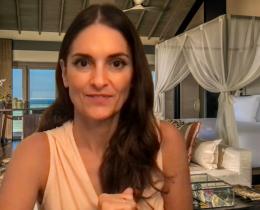Omega: Why did Omega decide to start a podcast?
Rob: We want to spread the programs and teachings that happen here in Rhinebeck beyond the boundaries of our physical campus. The Dropping In podcast takes some of Omega’s offerings and makes them available in a modified version to everyone.
To do this, we’ve created a rich audio experience that marries recordings from inside the classroom with interviews, narration, and music to create something with the production value of an NPR-style storytelling show. We brought in Karen Michel, veteran radio journalist and podcaster, to help make that happen.
Omega: What can we expect to hear on Omega's podcast?
Karen: Like Omega’s programming, we’ve got a little bit of everything—poetry, cooking, environmental rights, Buddhism, aging. That's the beauty of it. It’s a mix that will provide something unexpected to listeners.
Rob: Often people come to Omega to study with a specific teacher and are unaware of the breadth of what’s available. We have somewhere in the neighborhood of 350 programs that happen here every year that touch every facet of holistic living. That gives us a lot of opportunity for interesting and varied episodes that can open people up to another angle of the Omega experience.
Omega: What is your favorite or most interesting episode so far?
Karen: My favorites are always the ones where I learn something or I'm surprised by something. The episodes with Major Jackson and Anne Haven McDonald, two poets from the Orion magazine writers workshop, were surprises. I had no idea what to expect from them. As a person who reads a lot of poetry, and even writes it on occasion, it was a real pleasure to hear their ideas, and they were so open.
Another one I particularly enjoyed was the Ayurvedic cooking episode with Richard La Marita. I mean who could resist cooking? On top of that, they fed me, so that was lovely. And I have applied some of the things I learned. I didn't know that would happen.
Omega: Why do you think podcasts have become so popular?
Karen: I think part of it is because they're easy to get, they're time-shiftable, and they're about anything you can think of. There are now over 700,000 of them out there. If you want to hear about origami, you can find a podcast. If you want to know about Mozart's childhood, you can find a podcast. I think the incredible variety has a lot of appeal.
Rob: I think there are two reasons why they've really taken off. One is the very low barrier to entry: pretty much anybody can make one, and they're freely accessible. Second, in our world of phones and earbuds, you can consume them while doing anything in your life—while you're walking your dog or doing your dishes, taking out the garbage, or whatever, which is how I listen. You can listen to podcasts and multitask your life.
Omega: Karen, what would you say are the main differences between being a podcast host and being a radio reporter?
Karen: In radio, there are time constraints, and in podcasting, there aren't. Also, there is much more freedom in how one expresses oneself. I think the differences between radio and podcasting are underexplored in some ways—to the detriment of both media. Because my background is primarily in public radio, that's the sensibility that I bring to Dropping In. But Dropping In allows me to “drop in” in a way that I can't on the radio.
Omega: How does your approach to recording a podcast on Omega’s subjects differ from other programs you've hosted?
Karen: It would be easier to say how it doesn't differ. I still do a lot of research. I attend the workshops. If they've written books, I read all the books. I ask them if there are any other sources they think I should check out. I'll go to YouTube. I might read related scientific studies. Also, I tend to ask someone who knows about the field to give me their insights into this person's work so I have another person's perspective.
The name Dropping In really says what this podcast is about. We are not only dropping in on some of the presentations, we're dropping in to the teacher's ideas, and also talking with some of the participants—learning what brings them here and what they’re getting from the experience.
What's different about my approach to this podcast is I interview people for a much longer period of time. I might interview somebody for a news piece for half an hour, but these interviews are often an hour or more.
Omega: Is there anything else you want Dropping In listeners to know about the podcast?
Karen: It's listener-friendly. It doesn't pontificate. It hopefully allows listeners to come to their own conclusions, to drop in on these teachings and these ideas and decide what they think or what they might bring into their life if they’re inclined.
Also, it’s important to me that these conversations aren’t like every other interview out there. I am sometimes asking some tough questions about what a teacher says, which I think makes it far more interesting.
Rob: This is an evolving process and we don't yet know what will resonate most with our audience. We’re open to feedback and hope to hear from those who know Omega and those who find us through this podcast. We want to know what they like and don’t like and which teachers and topics they’d like us to cover.



